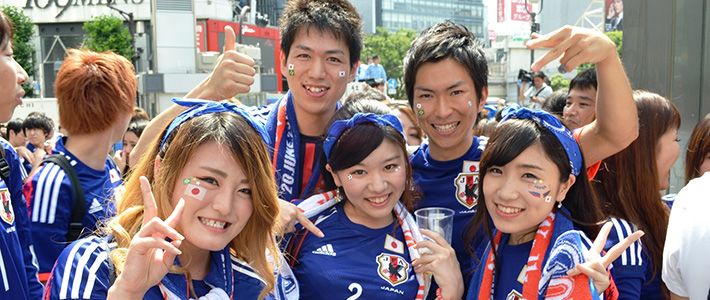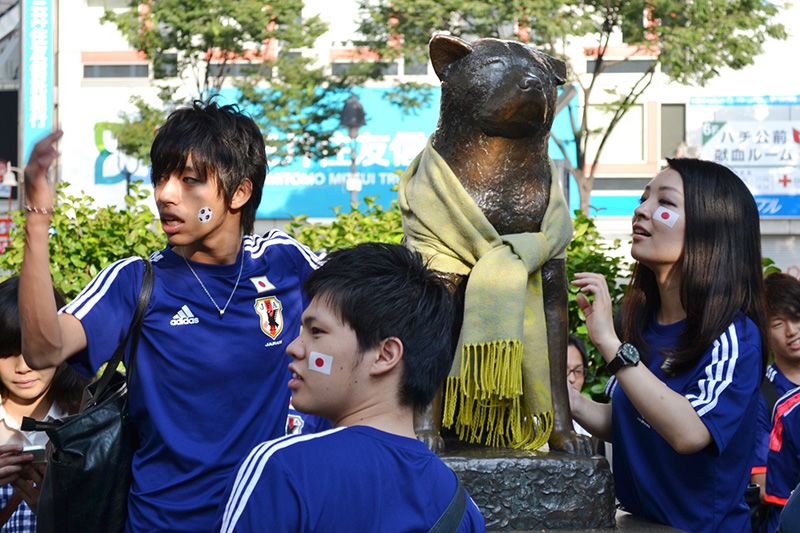
Japan's World Cup: The View from Shibuya
Society Culture- English
- 日本語
- 简体字
- 繁體字
- Français
- Español
- العربية
- Русский
To many, leaving the house shortly after 6:00 AM is a badge of honor and a regular feature of the working week. For me, though, the need to rise with the sun in the land of the rising sun is infrequent enough to make the times when it is required a shock to the system. And today this jarring effect was further compounded by my waking before 4:00, only to pass the hours until heading to my station in an alternately agitated, elated, and disconsolate state.
The reason for this is simple, and is a recurring condition that has no known cure: I, along with millions of others, am suffering from an acute episode of FIFA World Cup.
Observing the Early Morning Action
It is not an isolated outbreak, of course. But despite the pandemic nature, where the patients reside has a great bearing on the severity of their symptoms. Those of us on the Asian continent, where games were scheduled so perfectly during the 2002 tournament in Japan and Korea, have drawn the short straw for the Brazil World Cup. Susceptibility also varies according to national allegiance, and in this sense, too, my luck was out. It was another turgid England performance that perturbed me over my early breakfast.
All that said, leaving the house this morning actually brought some relief, for the day’s assignment was actually jolly good fun. After the land of my birth tumbled to a second successive defeat against Uruguay, the players of my adopted homeland were set for action as Japan squared off against 2004 European champions Greece. In Tokyo, when the national team plays there is something of a tradition of supporters congregating after the match around Shibuya’s famous Hachikō crossing, to celebrate, commiserate, or simply let off tension en masse. On occasion, these gatherings have been known to become somewhat rowdy, and a strong police presence—generally aimed more at ensuring the smooth passage of traffic than at quelling any boisterousness—has also become a staple of the event.
 Supporters at Shibuya’s iconic Hachikō statue welcome the well-known canine into their number.
Supporters at Shibuya’s iconic Hachikō statue welcome the well-known canine into their number.
That is not to say that the merry- (or morose-) making always passes without incident. Indeed, there were numerous reports of the sexual harassment of young women caught up in the crowds in the aftermath of last Sunday’s narrow loss to Côte d’Ivoire. And so, interested to see how the reality on the ground here compared to the widely circulated accounts of excellent behavior on the part of Samurai Blue fans who have made the trip to Brazil for this year’s tournament, several colleagues and I headed to Shibuya to file a report.
Sadness on the Streets of Blue
Arriving shortly before the game kicked off at 7:00, we found the area largely deserted, with most fans already ensconced in Shibuya’s crowded sports bars to watch the action. The few supporters who could be found and encouraged to provide comments were cautiously optimistic, and there was a consensus that we could expect a 1–0 victory for head coach Alberto Zaccheroni’s men.
 The gathering at Shibuya’s famous scramble crossing was overseen by a heavy police presence.
The gathering at Shibuya’s famous scramble crossing was overseen by a heavy police presence.
Sadly, that was not to be. Although Japan enjoyed most of the possession against a Greece side reduced to 10 men by the first-half sending off of their captain, Konstantinos Katsouranis, clear-cut chances proved hard to come by against a resolute Greek rearguard, and the game ended goalless. While this result didn’t make Japan’s progress to the second round a mathematical impossibility, it did take it out of the players’ own hands. Even if Japan can pick up a win in the third and final group game against in-form Colombia, fans will need to hope that other results also go their way.
This disappointment, along with the fact that the match came on Friday morning, at a time of day when most paid workers would be expected to already be either at or on their way to work, meant that the crowds this morning were sparse, the overall mood subdued, and that the colorfully kitted-out gathering was overwhelmingly dominated by younger supporters, many of whom were university students. Nonetheless, some did begin to perk up when asked for their opinions on today’s game, along with their predictions for the decisive Colombia clash.
 For many soccer fans, the occasion was an opportunity to dress up.
For many soccer fans, the occasion was an opportunity to dress up.
Looking Ahead Hopefully
Many questioned the tactics employed and the pace at which Japan set about attempting to break down Greece’s stern defense, as well as Zaccheroni’s use of the substitutes at his disposal. But most remained committed to the ideals of attacking football, with which the JFA hopes to establish the foundations for many Samurai Blue teams to come. Then, possibly surprisingly, when asked to forecast the result of the Group C decider, our respondents almost universally found their second wind, smiled and prophesied a resounding win for Japan.
I should have known it before now, I suppose, having lived in Japan for so long and seen the amazing unity and positivity after the March 11 disaster, but it truly is hard to dampen the spirit of these people. For my part, though, I’m off to gripe about England’s formation and spout doom and gloom to anyone who’ll listen.
A Soccer Morning in Shibuya
We’ve uploaded a video of some of the sights to be seen and people to be met in Shibuya when Japan plays in a World Cup match. Enjoy!
Soccer football World Cup Greece sports Brazil Zaccheroni Samurai Blue